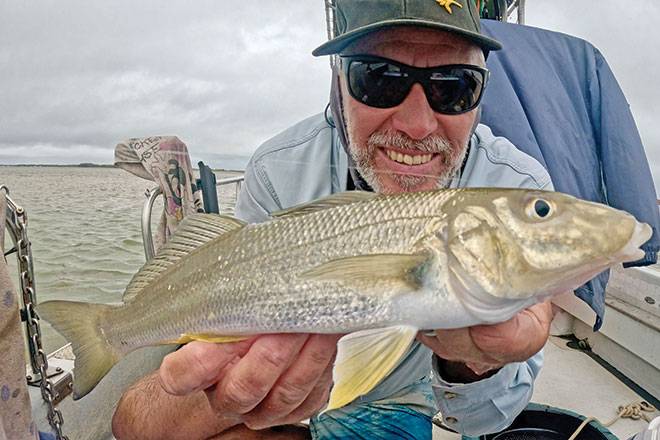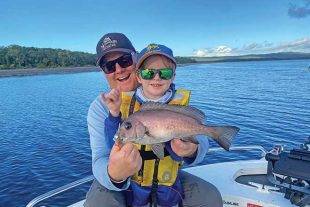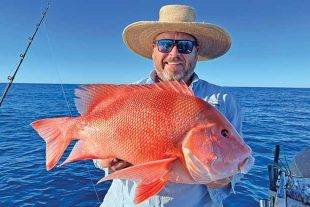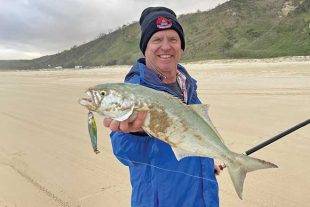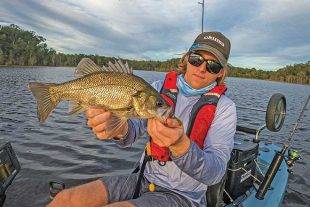Well, it’s a brand-new year with some fresh fishing opportunities, hopefully.
This can be a tough month to fish during the day because it’s hot, windy and at times stormy.
I used to be keen on night fishing but in recent years I much prefer to get out on the water in the early morning.
It’s a great time of year to catch big summer whiting on the yabby flats in the Broadwater and these fish are still plentiful in spite of the recreational and commercial netter fishing pressure.
There are two ways I chase whiting with my customers.
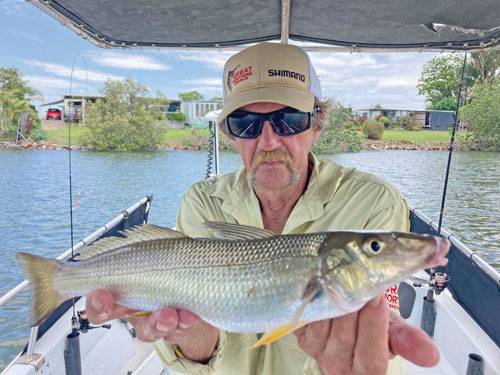
The first is drifting or anchoring in the Nerang River with beachworms.
While beachworms are not as good a bait as bloodworms, they still catch plenty of fish, are easier to get and are cheaper.
If the wind and tide flow are in the same direction and not too strong, I drift and cover shallow undulating sandy areas ranging from 1-3m deep.
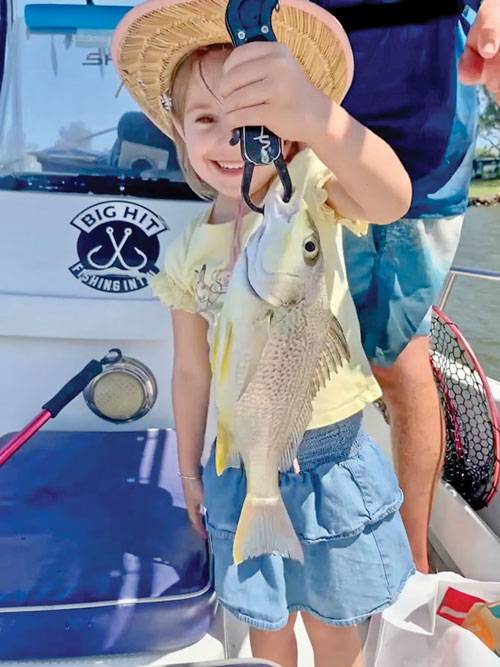
Using soft-tipped bait-fishing rods, 10lb Platypus Platinum mono line spooled on 2500 size spinning reels, a 2 or 3-size ball sinker, small swivel, at least 1m long 6lb fluorocarbon trace and a number 4 or 6 size baitholder hook, we then thread on just enough worm to cover the hook.
This way there’s not too much meat for the whiting to chew and you get better hook up rates.
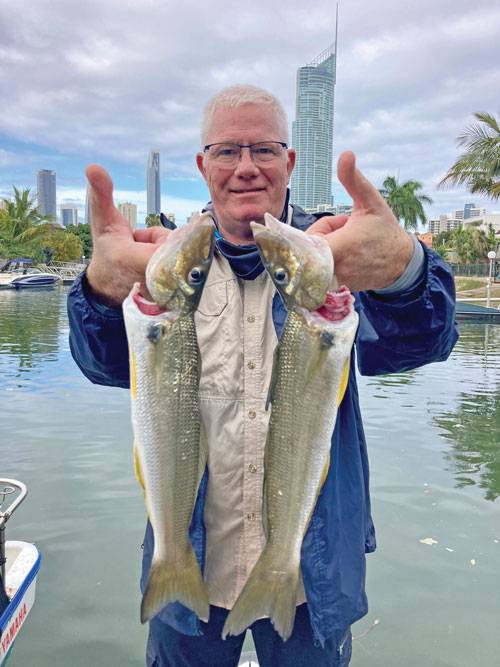
It is very important not to strike too early or you’ll miss a lot of fish.
They will first mouth the worm, then crush it.
Wait until the rods fully load up before you lift and start winding the fish in.
There is a lot of by-catch such as bream, grunter and flathead when fishing for whiting, so it pays to keep moving.
Remember, in Queensland whiting must be 23cm minimum size, bream 25cm, dusky flathead 40cm, barred grunter 40cm and spotted grunter 30cm.
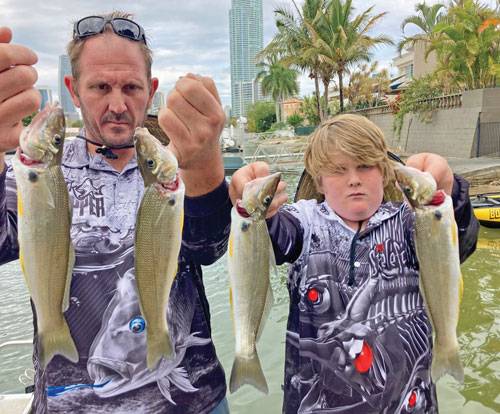
When the wind is opposing or across the tide, I spot lock and cast the bait out from the side of the boat, then place the rods in holders and wait for bites.
If they’re timid, feed out some slack line to encourage them to eat the bait.
At times, I’ll also troll for whiting in the river with hard-body lures.
For some reason, the new Samaki Redic Jerkbait 50mm lures in Coral Trout colour are consistent at getting aggressive strikes from big summer whiting.
The other fishing technique I love is wading in the shallows for whiting.
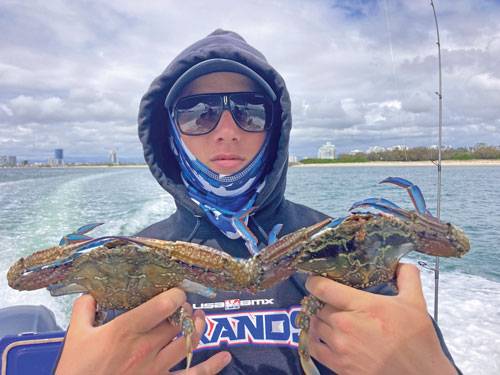
This is mostly done on the yabby flats at the Broadwater islands of Curlew, Wave Break and Crab.
These hold vast amounts of yabbies, which attract thousands of fish and stingrays to feed on them.
All we use is a wading bag, landing nets with elastic attachment to the bags, measurement ruler, long-nosed pliers, scissors, spare hooks and a yabby bucket that clips around our waist.
Ideal rods are the Insalt Estuary Explorer 6’6” 1-2kg ultralight or Atomic Arrowz 7” 1-4lb, coupled with 1000 size reels and spooled with 4lb fluorocarbon line.
We then pump yabbies wading the flats in clear water and clean sand, with yabby holes no more than knee deep, and flick the yabbies out on unweighted hooks, while at all times slowly moving, with the bail arm open and finger on the line.
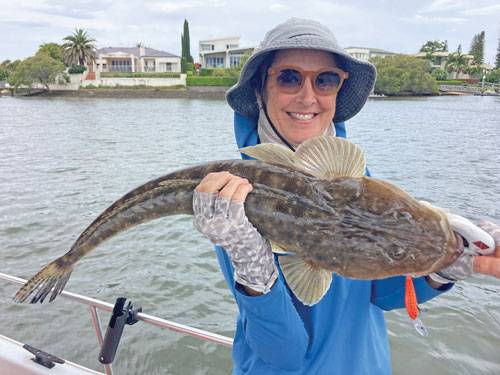
As soon as you feel a bite, let them run for 10 seconds then strike.
This is a guaranteed way to catch good fish, however you must keep moving to find the better quality whiting.
Essentially, it’s trolling yabbies by walking.
During either of these types of fishing, it is productive and good fun to put crab pots out near to where you’re fishing, in water 2-4m deep and baited with mullet or fresh fish frames.
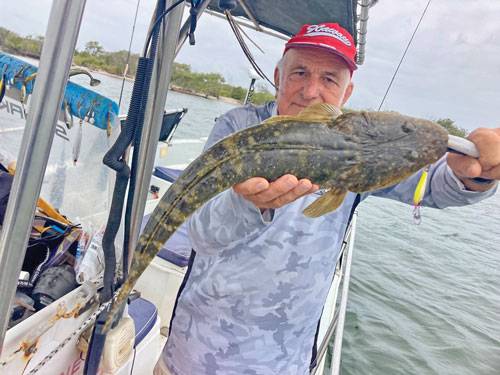
Try to check and move them every two hours for a feed of beautiful blue swimmer and mud crabs.
Remember to release all female crabs and measure the males to follow the rules.
Also, make sure your pots and floats are legally correct and marked with your name, address and phone number.
Well, there you have it, some tips to catch some summer treasures.
Until next month, tight lines and cheers.
To book a charter with myself or Brad, or if you have any fishing related questions, visit goldcoastrivercharters.com, SMS 0432 990 302, email fishingwithclint@gmail.com or find us on Facebook – Brad Smith Fishing Charters.
 Bush 'n Beach Fishing Magazine Location reports & tips for fishing, boating, camping, kayaking, 4WDing in Queensland and Northern NSW
Bush 'n Beach Fishing Magazine Location reports & tips for fishing, boating, camping, kayaking, 4WDing in Queensland and Northern NSW
